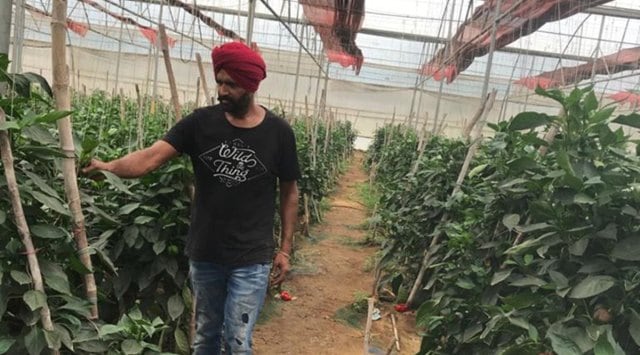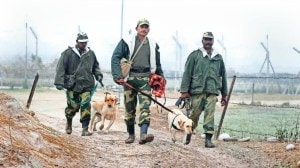- India
- International
Farmers into contract farming for years say lot of groundwork needed to make it a mass success
Farmers say there are several drawbacks in contract farming and before enforcing such a law at grassroots level there is a huge need to redress certain issues.
 Meharban Singh has been doing contract farming and growing vegetables in open fields as well as in a poly-house
Meharban Singh has been doing contract farming and growing vegetables in open fields as well as in a poly-houseFor the past 15 years, Meharban Singh – a progressive farmer from Sahauli village in Patiala’s Nabha sub-division – has been doing contract farming and growing vegetables in open fields as well as in a poly-house. While he started out by entering into a contract with state government-run Punjab Agro Foodgrain Corporation (PAFC), he later switched to working with PepsiCo. While Meharban says he is happy doing business with private players, he also justifies farmers’ protest saying that government too needs to do more to ensure fair play on the part of big corporates.
“I have been growing coloured capsicum, beans, broccoli, cauliflower, sweet corn, matter (green peas) etc. for PepsiCo since 2007-08 as earlier I was doing contract farming under Punjab government’s contract farming project, but gradually that got closed and then I made an agreement with Pepsi Co,” he said, adding that he is “happy with this system and gets his payment on time”.
Under buyback contract farming, Meharban said he gets 100 per cent technical support from the company which deputes field officers to visit his fields after every 15-20 days.
The seed is also provided to him by the company either at market rate or some time little below the market rate.
Meharban has been growing vegetables on 30 acres of land, including 20 acres of his own and 10 acres that he takes on the lease.

He does contract farming on 10 acres. The farmer said that he has not grown wheat and paddy for the past 17 years.
Explained: What was Punjab’s failed contract farming policy?
But he added: “Agriculture is a vast subject and mostly depends on the natural conditions and in CF all these things must be covered in the agreements in a fair manner. As fairness on the part of the company and farmer is required which is mostly lacking in contracts.” He said that under contract farming only the crops as per the market demands should be grown.
Kamljeet Singh Khaira, another progressive farmer from village Birarhwala in Patiala district, has also been into contract farming and grows potato on 50 acres of his own land holding and 10 acres he takes on lease.
He sells around 70 per cent of his potato crop to PepsiCo starting from the December to March. He grows 20 per cent seed potato, and 10 per cent of his crop is sold in the open market. Khaira said that he had done contract farming with a Jalandhar-based potato firm and with another private firm by growing mattar and corn.
Currently, he arrives at a mutual understanding with the company to sell his crop, but it is not under any formal buyback contract. “I share a good rapport with PepsiCo as they are aware that I grow potatoes for them only. They pay me as per the ongoing market price but at times I get price higher than the market and at times lower as well,” said Kahira, adding that he sells all his crop only to private players.
Like these two farmers, there are several farmers who have been doing contract farming in Punjab for various crops including Basmati, but despite having good rapport with private players and selling to them, most of these farmers justify farmers protest against the three agricultural laws including the bill on contract farming titled ‘Farmers (Empowerment & Protection) Agreement of Price Assurance and farm services Bill)’.
They say that there are several drawbacks in contract farming and before enforcing such a law at grassroots level there is a huge need to redress certain issues.
Diversification, good domestic and international markets, fair contracts with the companies are the basic things which are required in successful contract farming, said farmers as well as experts.
Experts said that contract farming would be successful only if diversification is done in the area under various crops as per the demand of the market as it is not possible in wheat and paddy cycle which are grown in bulk around 32 million tonnes (320 lakh tonnes wheat and paddy is grown in Punjab). Even big multinational companies cannot buy such a huge amount of wheat and paddy from the state, said experts.
Under contract farming most of the companies provide their own seeds, machines, and technical know-how. But despite all such support if the farmers crop is not as per their standard then they make several cuts and do not provide the rate they promised to the farmers.
“For CF, the contracts should be made in ‘black and white’ so that neither farmers nor the companies suffer losses and in case of any loss and it must be shared by both not only by the farmers,” said Horticulture Development Officer Daljeet Singh.
“I can say from my experience with CF (contract farming) in past two decades that government should prepare a roadmap for CF, the farmers should get agricultural universities or institutes, recommended seed varieties, which must be suitable to the soil and environment of the state,” said farmer Kamljeet Singh, adding that some time despite providing good seed the crop does not come out as per the desirable standard because of poor quality of soil or environmental conditions and farmers face the losses then.
He said that small projects of the crops suitable in different regions of the state should be started and after their success it can be done on a large scale in these respectable regions.
“In Punjab itself, there are the regions to grow best Basmati, best potato, maize, fuirts, vegetables, melons etc. and government should support farmers as per the demand in the domestic and international market rather enforcing bills on them without preparations,” said a senior officer in Punjab Agriculture department. Manjit Singh, who runs a Atam Roller Flour Mill, which has the capacity of 2-lakh quintal wheat in Zira in Faridkot and several wheat growers associated with him who sells their crop to his mill, said that under CF diversification is must and small and medium scale industry must be strengthened so that different crops can get market in the state itself.
“Earlier, the focus was on quantity, but now the focus should be shifted on quality of the crops under CF so that the produce can be exported to various countries,” he said.
“If government wants to write a successful story of contract farming then the government should keep a check on the private companies and should set up R&D units in the crops to be grown in any region along well researched good markets for every grown crop under CF,” said former Director, Punjab Agriculture, Dr Sutrantra Kumar Airi, who justifies the farmers’ agitation against agri Bills.
Diversification challenge
In 2013, a new agriculture policy for state was launched by the then SAD-BJP government with main focus on diversification. Under this, the state government had planned to diversify 12 lakh hectares (29.64 lakh acres) from paddy to other crops but there was no planning to divert area from wheat crop, which is grown on 35 lakh hectares out of total over 39 lakh hectares of crop area in Punjab.
Under diversification, the government had planned to increase 4 lakh hectares under maize and 8 lakh hectares under basmati, cotton, sugar cane, agroforestry, vegetables and fruits in already existing areas of these crops. But SAD-BJP failed to achieve that aim. Now the current government has managed to decrease around 5 lakh hectares (12.35 lakh acres) under paddy since 2018 and diverted it under basmati, maize, and cotton crops. But area under wheat is the same.
Experts said it would be possible to achieve diversification goals, if governments are keen to prepare a roadmap for farmers as per the demand in domestic and international markets and support farmers financially, technically for quality produce and stand by them at the time of natural calamities.
May 13: Latest News
- 01
- 02
- 03
- 04
- 05






































